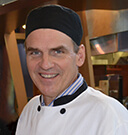Food Waste – Interviews with locals making a difference
We talked to a few local people that are working on food waste to learn more about what can be done in our community.
Heather Coton
Heather Coton is the Environmental Manager and Executive Assistant to the General Manager of Delaware North at The Gideon Putnam. Her work at The Gideon has made it a leader in our community on sustainability initiatives. Check out their sustainability initiatives here.
Heather, what are some of the ways that The Gideon Putnam is reducing food waste?
Since April 2016, The Gideon Putnam has diverted 56 tons of food waste from the landfill. We were collecting compost and having it hauled to Ulster County. We were committed to the cause, but could not find a local solution. Moving forward, we just installed a food digester in our kitchen that can handle up to 500 lbs of food waste per day. Enzymes help to break down the food and turn it into grey water that goes right into the sewer system. Saratoga County Sewer District is excited about the decision as Saratoga and Albany Counties just announced their own plans to build an anaerobic digester facility that will convert food waste into energy.
What did you learn in the movie Wasted! that surprised you?
One third of all food produced is thrown away. Not only the food that we as individuals throw away because it has gone bad, but over-production at the farm level, consumers over buying, and grocery stores throwing away perfectly good food because of “best by” and “sell by” dates.
What are some food initiatives that you would like to see embraced?
I have been composting at home for 12 years – it is so easy, and even with minimal attention to the compost pile, you will end up with beautiful, nutrient rich, black soil. Not everyone has the space to do this, so I would like to see food collection made available at the local transfer stations.
What is one thing about food waste that you wish everyone knew or understood?
Food is precious and once upon a time, people wasted nothing. There is a nose to tail movement for using all parts of the animal, and that type of thinking has recently emerged for agriculture. Most parts of many vegetables are edible – educate yourself on all these tasty options.
Do you have any tips for people to reduce their food waste?
Buy smart, use everything that you buy, save your veggies scraps and carcasses for soups and stocks.
Watch the movie Wasted! The Story of Food Waste – educate yourself and others.
Learn to compost and never throw your food in the trash again. Not only will you help save the environment, but you’ll have less trash to dispose of which means more dollars in your pocket.
Jim Rose
Jim Rose is an Executive Chef at Skidmore College. He shared his experiences starting a composting program in the Skidmore dining facilities.
Jim, how are you working to reduce food waste at Skidmore?
We continue to raise awareness to our students both from a post-consumer and pre-consumer end.
Post-consumer waste reduction efforts: By working with Sustainability fellows to create visual signage which is posted throughout the dining hall and by the dish accumulator. For example “Taste it Don’t Waste It” and factoids regarding food waste. Our Sustainability students have also been instrumental in hosting frequent “Food Waste Audits” whereby they collect leftover foods that consumers leave on their plates during a meal period. The food is weighed every hour and the weight is posted in front of the dish accumulator. We have found that this has been very effective. Unfortunately, this is all done by volunteers and it’s difficult to host these as often as we would like. We have found that doing these audits in the beginning of our school year is much more effective than toward the end.
Pre-consumer waste reduction efforts: As for pre-consumer waste, training our student employees on knife skills and maximizing the utilization of items that they are preparing is the key to reducing food waste. We also use daily production sheets to provide our chefs and cooks guidelines for menu preparation. This is a crucial tool for us to monitor over and under menu production. We send any leftover foods that no longer can be used to support our menus to the local food pantries. A student club on campus called Feedmore helps in this process. Our dining hall is comprised of multiple self-service serveries. In an effort to control food waste reduction we have found that pre-plating menu items on smaller 6” plates and letting the students know that they can always come back for more, helps control the amount of foods that gets discarded as food waste.
What did you learn in the movie Wasted! that surprised you?
I was absolutely astounded when I heard that it could take up to 25 years for a head of lettuce to decompose in a landfill. I found it also very interesting to view how Europe looks at Food Waste as compared to the USA!
What are some food waste initiatives that you would like to see embraced?
All of our (75) dining services employees and management team are on board with reducing food waste. We have ordered Anthony Bourdain’s documentary and plan on showing it to our staff before our summer programs begin. I feel that we also need to do more to educate our students and campus community heightening awareness to get more students actively involved with this important message.
From a culinary standpoint I would like to implement using more of the common discarded trim of vegetables, i.e., cauliflower leaves, radish leaves, etc. This would entail creating flavorful and well-presented recipes that will appeal to our consumers. Globally, I feel that every nation should be working on eliminating food waste and utilizing potentially wasted foods to feed those in need.
What is one thing about food waste that you wish everyone knew or understood?
The duration that it takes to breakdown in the landfill, increasing methane gas emissions. How hard is it to grow a tomato or any type of fruit/vegetable.
Do you have any tips for people to reduce their food waste?
Think about what you really need before going the grocery store. Take a list and try to adhere to the list especially when it pertains to perishable foods.
Think about how you can utilize leftovers versus discarding them after they have sat in the refrigerator too long.
Nurcan Atalan Helicke
Nurcan Atalan Helicke is an Associate Professor of Environmental Studies and Sciences Program at Skidmore College. She has spent a lot of time thinking about food waste, from a local to a global scale.
Nurcan, what did you learn in the movie Wasted! that surprised you?
The movie does a good job demonstrating the volume of waste we produce every day and how big and critical it is for our agricultural and food system. Like the commentators, I was surprised to hear how long it takes for a head of lettuce to decompose in the landfill. That 25 years puts things into perspective for many of us and to understand that it does not go away. I was also surprised to hear how white male chefs were boasting about inventing ways to reduce food waste and making every part of the food ready to be used. Although Dan Barber mentioned that every culture has a food item that has come up with inventive ways to make less desirable parts of the animals and plants edible, I did not like how these chefs were taking credit for non-Western, traditional, cultural ways of respecting food. The Western diet, and the American diet, with its preference for certain types of food has increased the food waste and this was not mentioned in the documentary. People used to also compost by thrashing their organic waste into their soils before the use of chemical fertilizers.
What are some food waste initiatives that you would like to see embraced?
I would like to see more small scale, decentralized food waste composting initiatives around us. Such systems exist all around the world: New York City has been collecting organic materials from about 300,000 households since 2016 turning it into biogas and compost. They are successfully doing it and have diverted 2% of organic waste from landfills in their first year. They started with 80 drop off points and now they have expanded. In Albany, Radix Ecological Sustainability Center offers a community compost initiative. We have been composting in my household for the last five years in our new home. But we have been concerned about our neighbors and their reaction. You never know. If more people do it, then it will open up conversations, people will be more aware and willing to participate in other waste reduction or reuse initiatives.
What is one thing about food waste that you wish everyone understood?
I wish everyone spent more time planning and preparing for meals. The less waste we produce, the better it is. We need to be more conscious about how we prepare meals. However, our lives deprive us from time that needs to go into planning, preparing and cooking food. We spend less time on food preparation compared to five decades ago. Young people spend less time than older adults. Studies show that the more time people spend preparing, planning, storing meals, the less food waste is created.
Do you have any tips for people to reduce their food waste?
I like looking through old cookbooks and recipes from different cuisines around the world. It is fascinating to learn about how people used their rationed food during World War II in the USA, or how South Koreans turned the surplus processed foods from US military bases into a spicy stew soon after the Korean war. The dish, budae jiggae, means army base stew and is a spicy stew incorporating spam, sausages and other leftover available meat.
I also think about different ways my family cooked food. I grew up in Turkey. My aunt would not throw away the tops of peppers she prepared for stuffed peppers. She would use the meaty part under the seeds of the pepper in a sautéed dish with onions and tomatoes the next morning for breakfast. It was a very tasty meal, and none of us thought about it as eating food waste. Similarly, my mom made papara, a Turkish dish, meaning bread meal, from stale bread. It was also a delicious and nutritious meal. We sometimes forget how people respected their food resources and aimed to use every part of it.
Do you have any resources to share with our readers?
People should visit Radix Ecological Sustainability Center to learn about closed loop systems, and how inputs and outputs can be integrated in the agri-food systems. It is in Albany, and every last Sunday, it has an open house.
Similarly, there are several farm days around us here. In September there is the cheese weekend, in March maple syrup weekend, and in April fiber weekend. Many of these farms have come up with innovative ways to reduce waste at the production stage, and the farmers are willing to share what they are doing.
By learning what it takes to produce food, more of us can appreciate what it takes to grow and produce food, respect it more, and think about reducing our food waste.
